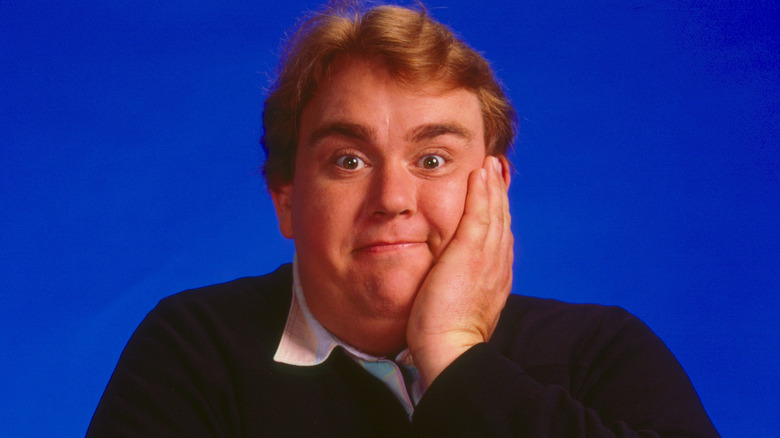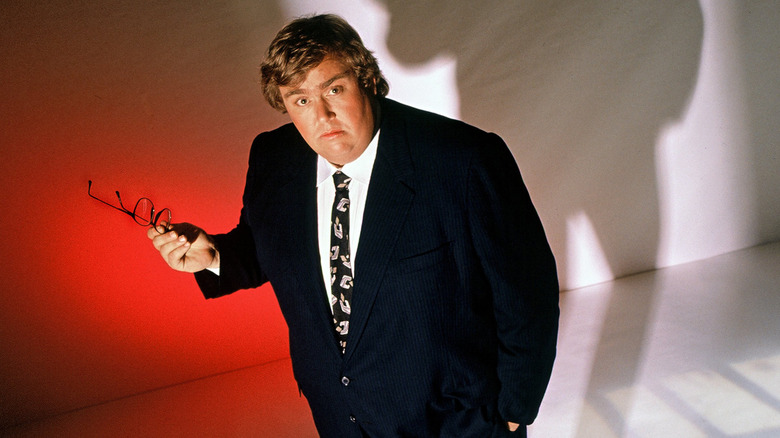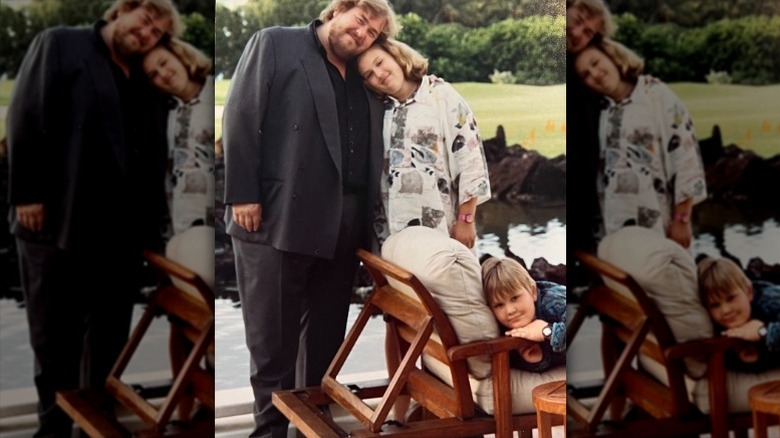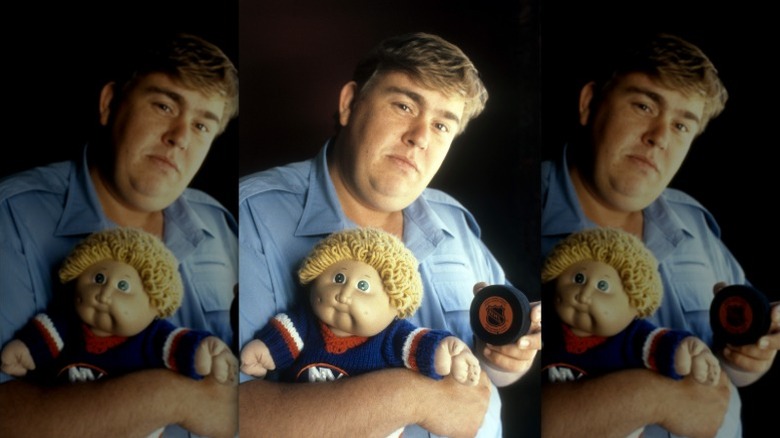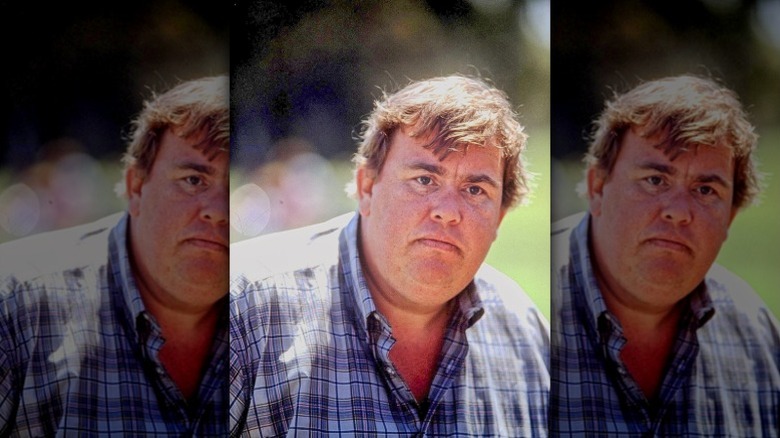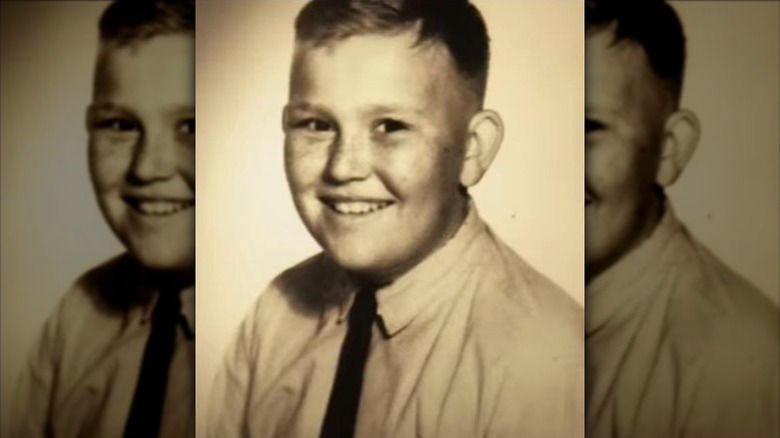Tragic Details About Comedian John Candy's Life
The following article discusses disordered eating, mental health issues, and substance use.
John Candy spent years putting a smile on countless faces through his affable characters. As it turned out, the late "Home Alone" star was no different away from the cameras. "I wish I had some more bad things to say about him. But that's the problem when you talk about John. People don't really have a lot of negative things to say about him," Bill Murray says at the beginning of "John Candy: I Like Me," the September 2025 documentary directed by Colin Hanks (via Scraps from the Loft).
John's affability made his untimely death all the more tragic. At just 43, the actor died at the peak of his fame from a heart attack while filming "Wagons East" in Mexico in March 1994. He left behind his wife, Rosemary Hobor, and two young children, Jennifer and Chris Candy, who were aged 14 and 9. "I remember talking to him the night before he passed away and he said, 'I love you and goodnight.' And I will always remember that," Chris told The Hollywood Reporter in 2016.
Jennifer had also talked to her father that same night. "I was talking to him on the phone, and, I hate this, but I was slightly distant because I was studying," she recalled. John's death was the tragic end to a long health saga involving family history, weight struggles, lifestyle concerns, and mental health issues. John had a successful career and a loving family, but he battled personal demons his whole life, something he often hid behind his comedic genius.
John Candy faced plenty of fat-shaming
John Candy disliked giving interviews. Plenty of actors love to discuss their work, but John knew those weren't the type of questions he would be getting. Whenever he sat down for an interview, he braced for rude questions about his weight. The interviewers never failed. "It's heartbreaking," Colin Hanks said on the "Happy Sad Confused with Josh Horowitz" podcast in October 2025. "That, particularly, was so soul-crushing to me."
After watching countless hours of footage of John for "John Candy: I Like Me," Hanks was appalled at the lack of compassion extended to the comedian. "To see, first off, how uncomfortable John was in an interview, and it was because, deep down, he knew, 'They're going to ask about my weight,'" Hanks said. The problem wasn't the subject itself — it was the shaming quality of the interviewers' questions. "When you see how people asked him about his weight, it makes sense," he said.
The only silver lining was realizing how much we've evolved as a society since those days. "[They asked] in a way that, quite honestly, is not acceptable — just would not fly in this day and age," he said. Hanks wasn't the only one shocked. John's son, Chris Candy, had a similar reaction. "I was kind of shocked to see how interviewers treat him," he said at a special screening of the documentary (via People). "That was just kind of heart-wrenching. And I also could see how he got more frustrated and he found ways to deal with that."
John Candy developed disordered eating amid weight issues and fatphobia
The fat-shaming John Candy experienced in the media led to bigger problems. Because he knew how the public felt about his weight, he was terrified of being seen around food. "He was so nervous about eating in front of people because of paparazzi," his son Chris Candy said at the special screening of "John Candy: I Like Me." As a consequence, John fell into disordered eating patterns in desperate attempts to lose weight fast. "He'd be like, 'Alright, well I'm not going to eat all day. I'm going to eat at night,'" Chris shared.
Chris was just a kid when his father died, but he wishes he had been older and wiser to help him navigate the situation. "It's like, 'How cornered are you?' And you really want in those moments, as his son or as his friend, to be able to grab him by his shoulders and say, 'Why the f**k do you have to do this? Just who cares? Have a sandwich and get mad about it,'" Chris said.
Chris got even angrier seeing how his father was treated in interviews because he saw how much John tried to keep his weight under control. "He always worked on his weight and his health," he said in The Hollywood Reporter interview. John exercised religiously and jumped on whatever fad diet that inevitably came out year after year. "He had trainers and would work at whatever the new diet was. I know he did his best," Chris revealed.
John Candy struggled with his mental health
John Candy had lifelong issues with anxiety, later developing a panic disorder on top of it. His struggles even prevented him from feeling proud of his own craft. "I don't watch my movies," he once said, according to a 1994 People cover story. "I just get too critical of myself." Being in front of a live audience also triggered his anxiety. "I did the 'Tonight Show' once, and I choked up," he said. "I get intimidated."
In his early 40s, John sought professional help to treat his panic attacks. "He would just stand backstage before he went on with his eyes shut, breathing in and out," producer Peter Kaminsky, who was a close friend of the actor's, told the magazine. In fact, Kaminsky conjectured that John's disordered eating and substance use were related to his mental health struggles. "Eating, ingesting, smoking," he contended. "For John, it was a way of swallowing that anxiety."
In a 2019 episode of "Autopsy: The Last Hours of...," forensic pathologist Dr. Michael Hunter made a similar claim. "I've discovered that John was prone to binge eating in response to professional setbacks," he said in the Reelz docuseries (via Star). Given his father's aversion to watching anything he had starred in, Chris Candy believes John would not have liked Colin Hanks' documentary about his life. But he would like to be wrong. "I would hope though, the John Candy of 2025, he would've worked on himself enough to be okay with himself," he told People in October 2025.
Fatphobia may have contributed to John Candy's substance use
John Candy didn't feel comfortable eating in front of others, so he substituted food for other substances. "Like, 'Okay, but I can have a drink, or I can have a cigarette, and then when I get home at the end of the day, at the hotel room or whatever, then I'll eat,'" Chris Candy told Us Weekly. While the fatphobia that followed him might have contributed to his substance use, John's lifestyle didn't help.
Shortly after attending Toronto's Centennial Community College, he met fellow Canadian actor Dan Aykroyd and joined the Second City comedy troupe. "The next thing I knew, I was in Chicago, where I learned how to drink, stay up real late and spell 'd-r-u-g-s,'" Candy told People. While he didn't discuss it, John was rumored to be a habitual drug user. "John appears to have a history of use of another drug that is also known to have a damaging impact on the heart — and that's cocaine," Dr. Michael Hunter said in "Autopsy: The Last Hours of John Candy."
He reportedly also drank quite a bit, a habit he maintained until his death. "He liked to go to parties and he was known to indulge," friend Jonathan O'Mara said in the docuseries (via Radar). However, John did his best to keep temptations at bay, even joining the list of celebrities who refused a gig on "Saturday Night Live." "He knew the lifestyle wasn't going to be healthy for him," Jennifer Candy told Today in April 2025.
John Candy lost his father when he was a young child
John Candy hadn't even hit kindergarten age when he lost his father. Like himself, his dad died of a heart attack just three days before the future actor's 5th birthday. Sidney Candy was only 35. The untimely death had long-lasting effects on John. For starters, it forced him to grow up too fast. "John took over being the dad. He was the child that made everyone happy," Sidney's widow, Rose Candy, said in "John Candy: I Like Me" (via Scraps from the Loft).
Sidney's death also made John aware of his own mortality much too early. Because his father died of a heart condition at an incredibly young age, John always feared he was sentenced to a similar fate. His family also shared those fears. "It was always in the back of everybody's mind," his brother-in-law, Frank Hober, told People in its 1994 cover story. "No one talked about it, but it was in the back of John's mind too."
However, John didn't have the same information about the hereditary factor of heart disease in his day. "I don't think he was aware of the genetic heart disease that was in the family. You wish he had figured it out," Chris Candy said in the 2016 interview with The Hollywood Reporter. But he knew enough to understand it ran in families. "His father had a heart attack, his brother had a heart attack. It was in the family," Chris explained.
If you or anyone you know needs help with addiction issues, an eating disorder, or needs help with mental health, contact the relevant resources below:
-
The Substance Abuse and Mental Health Services Administration website or contact SAMHSA's National Helpline at 1-800-662-HELP (4357).
-
The National Eating Disorders Association website or contact NEDA's Live Helpline at 1-800-931-2237. You can also receive 24/7 Crisis Support via text (send NEDA to 741-741).

